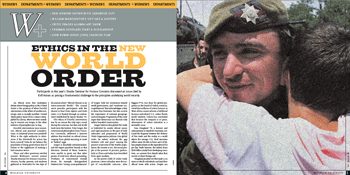Ethics in the New World Order
 Participants in this year’s Shasha Seminar for Human Concerns discussed an issue cited by Kofi Annan as posing a fundamental challenge to the principles underlying world security.
Participants in this year’s Shasha Seminar for Human Concerns discussed an issue cited by Kofi Annan as posing a fundamental challenge to the principles underlying world security.
An ethical issue that underpins debate about foreign policy in the United States is the question of when forceful intervention in the affairs of another sovereign state is morally justified. United States policy varies from a stance exemplified by Liberia, where we were unwilling to commit any troops, to the other extreme of preemptive war in Iraq.
Forceful interventions raise numerous ethical and practical considerations. Is unilateral action ever justified? What is the right authority to determine if the threshold for action has been crossed? How do we balance the possibility of doing good versus that of failure or the nightmare of making a bad situation worse.
These and other questions swirled around Wesleyan’s second annual Shasha Seminar for Human Concerns. Alumni, faculty, parents, and students gathered in November for two days of discussion about “Ethical Choices in an Interconnected World.” The annual event provides participants with the chance to hear from experts and trade views; it is funded through an endowment established by James Shasha ’50.
The ethics of forceful intervention was by no means the only topic raised during the seminar, but that and world trade were the hottest. Peter Singer, the controversial philosopher from Princeton University, delivered a keynote address that touched on ethical issues ranging from global warming to trade to “battery” eggs.
Singer is decidedly internationalist, and the expert panelists leaned in that direction. Several of them, however, were careful to point out that other points of view have ethical grounding. Professor of Government Donald Moon, for example, distinguished between the “strong cosmopolitanism” of Singer, with his orientation toward world government, and “moderate cosmopolitanism” that acknowledges a duty to those less fortunate, but also asserts the importance of national groupings and sovereignty. Proponents of this view argue that democracy can flourish only within bounded communities.
Singer believes that global free trade is bedeviled by murky ethical issues and rigid positions on the part of both advocates and proponents of World Trade Organization policies. Has global trade, he asked, widened the gap between rich and poor? Among the poorest 10 percent of the world’s population, the answer is yes. But many people in the poorest 33 percent, particularly in China and India, have benefited from open markets.
As the poster child of unfair trade practices, cotton subsidies were the target of considerable criticism. John Riggan P’94, vice chair for global programs on the board of Oxfam America, noted that millions of cotton farmers in West Africa cannot achieve a livelihood because subsidized U.S. cotton floods world markets. Oxfam has concluded that because the inequity is so great, elimination of cotton subsidies is a winnable issue.
Sara Hoagland ’78, a lecturer and administrator at Stanford University, criticized the disparity between the rhetoric of free trade and the reality in a world where the average U.S. chief executive officer earns $1,000 an hour and 2.8 billion people subsist on the equivalent of $2 per day. Trade barriers, she added, drain $200 billion yearly from developing countries, an amount that dwarfs what they receive in direct foreign aid.
Hoagland pointed out that trade is an issue on which individuals can back their ethical views with action. People can choose what to purchase: whether from agribusiness, a local organic farmer, or growers in Kenya. She urged better labeling of products to trace their provenance.
Our ethical obligations to help others also become murky when the issue is responding to gross violations of human rights.
Arman Grigorian, visiting instructor in government, cautioned that too little attention is paid to the risk of failure.
“It is not always better to do something than nothing unless you are prepared to bear the cost,” he said.
Interventions have often worsened a bad situation, he argued. In Somalia, Kosovo, and in the Kurdish area of Iraq during the ’90s, foreign intervention led to a dramatic escalation of violence against minorities. Sometimes, he suggested, non-intervention is the lesser of two bad options. For instance, 40,000 Kurds died in Turkey during eight years of conflict, but the government prevailed and violence then tapered off. Grigorian believes that foreign intervention could easily have resulted in more, not fewer, casualties.
When intervention is called for, there may be no agreement about who should intervene. The United Nations currently has 13 peace-keeping operations, yet many countries are reluctant to endow the organization with too much security capability, according to Victoria Holt ’84, co-director of the Future of Peace Operations project at the Henry L. Stimson Center in Washington, D.C. An authority on the United Nations and peace-keeping issues, she says the organization is finally developing more ability to respond quickly when a consensus exists in the veto-bound Security Council. But all the capacity in the world will not help if the political will to intervene is absent, as was the case in Rwanda, where 800,000 people perished in ethnic conflict.
Salih Booker ’80, executive director of the advocacy organization Africa Action, questions whether humanitarian intervention is nothing more than a new form of colonialism in an interconnected world of highly unequal states. “Global governance looks like minority rule of the G7,” he says. “Access to human rights is based on race, place, and gender,” which he called a form of “global apartheid.”
“We need to think of human security, not national security,” he suggested.
As during last year’s Shasha Seminar, questions far outnumbered answers. Participants got a taste of the complicated issues facing those who, in their professional lives, wrestle with issues pertaining to globalization and humanitarian intervention. Still, one panelist had some words of advice for citizens of the United States. Responding to Singer’s argument that Americans need to act more ethically, or selflessly, towards the rest of the world, David Fagelson ’80, associate professor of law and society at American University’s School of Public Affairs, noted that many of the flawed policies that most harmed the rest of the world could be corrected only if Americans change domestic policy. He argues, for example, that government subsidies to the oil, gas, and agricultural industries, which stimulate over-consumption, have harmed Americans both as consumers and as victims of environmental degradation. The answer to how we can help others,” he says, “is to think more clearly about where our own self-interest lies.” Moreover, changing these policies in the United States will, in his view, have more impact on the well-being of the rest of the world than many of the technical assistance programs that we might take abroad.

